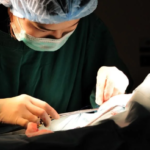A team of Rwandan and French scientists is at the forefront of groundbreaking research utilizing artificial intelligence (AI) to revolutionize cancer detection, treatment, and fetal biometric measurements. This innovative work is spearheaded at IRCAD Africa in Kigali, a regional hub for minimally invasive surgery training, research, and development.
IRCAD Africa, inaugurated in October 2023, operates under the umbrella of IRCAD France and collaborates closely with its Paris-based counterpart. One of its flagship initiatives, the Disrumpere Project (short for Democratisation of automatic diagnosis, screening, biometrics, and augmented percutaneous surgery assisted by artificial intelligence), involves a multidisciplinary Franco-Rwandan team of 20-30 researchers.
Transforming Cancer Diagnosis and Treatment
The Disrumpere Project leverages AI-powered ultrasound technology to create cost-effective medical imaging solutions, specifically targeting underserved regions where access to skilled healthcare professionals is limited.
“This technology allows for real-time detection of liver tumors and facilitates procedures such as biopsies and minimally invasive treatments like radiofrequency ablation,” explained Dr. Alexandre Hostettler, Head of the Surgical Data Science Team at IRCAD France and IRCAD Africa.
The system’s user-friendly design, coupled with portable probes, enables non-specialists to perform diagnostic imaging and treatments. This approach aims to democratize medical procedures, making them accessible to more communities across Africa and beyond.
AI for Fetal Biometric Measurements
Another critical component of the project focuses on using AI to analyze ultrasound images for fetal biometric measurements. Algorithms have been developed to assess parameters such as femur length, brain circumference, and abdominal circumference, essential for determining a baby’s weight and gestational age.
Dr. Hostettler highlighted the extensive training these algorithms underwent using data from high-quality imaging systems worldwide. Although the system is still under trial, researchers aim to optimize the technology so that minimally trained individuals can perform accurate measurements in under two minutes.
Addressing Global Healthcare Disparities
The initiative responds to a stark global healthcare gap highlighted by a 2021 World Health Organization (WHO) report, which revealed that five billion people lack access to medical imaging, while two billion lack basic surgical services. These disparities are particularly pronounced in Africa, where access to minimally invasive surgery remains scarce.
Professor Jacques Marescaux, founder and chairman of IRCAD France, emphasized the critical role of such innovations in addressing these challenges. By harnessing AI, the project aims to bring life-saving medical technologies to remote and underserved areas, bridging a gap that has persisted for decades.
As the Disrumpere Project continues to evolve, the collaboration between Rwandan and French scientists demonstrates the transformative potential of AI in reshaping global healthcare delivery.









